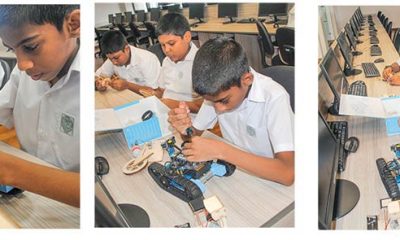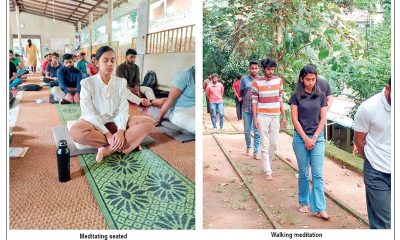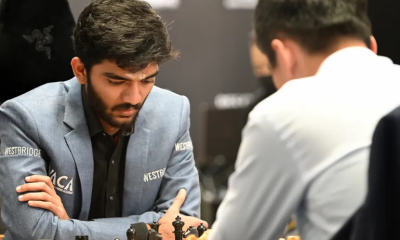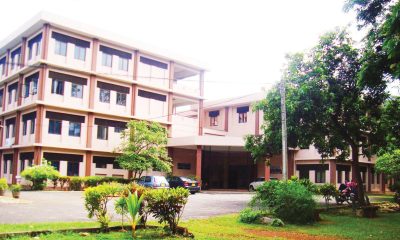Editorial
If wishes were Tigers …

Wednesday 15th February, 2023
P. Nedumaran, who leads a fringe group in Tamil Nadu, has got grabbing headlines down to a fine art. He used to ride on the tiger tails of the LTTE, as it were, when Prabhakaran was around, and attracted a great deal of media attention. He has sought to do so again. He has told the media that Prabhakaran is still alive and will appear in public soon. He made a similar claim in 2018, and more than four years have since elapsed. Maybe the task of returning from the dead takes much longer than Nedumaran thinks it does!
If wishes were Tigers, so to speak, Nedumaran and others of his ilk would ride them. He is one of the few politicians who rode the Tigers, smiling like the young Lady of Niger, but were lucky enough not to return inside the beasts.
Nedumaran’s claim could not have come at a better time for the Rajapaksas, who are desperately looking for a bogey in the run-up to a crucial election to instill fear in the Sri Lankan public and offer to protect them against evils such as terrorism. It is claimed in some quarters that the recent brouhaha over ICE (crystal methamphetamine) finding its way into schools was part of their strategy to make a comeback by undertaking to save children.
The Rajapaksas have been accused of bribing Prabhakaran into forcing the people in LTTE-controlled areas to boycott the 2004 presidential election to enable Mahinda to win at the expense of UNP candidate Ranil Wickremesinghe. Eighteen years later, the Rajapaksas had to make Ranil the President perhaps due to karmic forces at work. They are likely to be accused of having paid Nedumaran to say that Prabhakaran is still alive so that they can market their brand of patriotism again by offering to protect the country!
It has been proved that Prabhakaran went the way of all flesh in the shallows of the Nandikadal lagoon in May 2009. But that will not prevent LTTE backers from waiting for the Tiger leader’s return. Nedumaran, 89, has exemplified Alexander Pope’s assertion that ‘hope springs eternal in the human breast’. He is still waiting for Prabhakaran! He is not alone in doing so. Let all of them be asked to be careful what they wish for.
What would happen if Prabhakaran were to return by any chance? He would not dare close even a bathroom tap, having learnt from his colossal blunder of shutting down the Mavil Aru sluice gates and forcing the Mahinda Rajapaksa government to retaliate, triggering Eelam War IV; Erik Solheim, who is serving as President Ranil Wickremesinghe’s international climate advisor would be re-designated as Norway’s Special Peace Envoy; the TNA leaders would have to visit the Tiger leader in the Vanni jungles, take his orders and act as his mouthpiece; they would have to accept the LTTE as the sole representative of the Tamil community; children in the North and the East would have to stop going to school again for fear of being abducted on the way and turned into cannon fodder by the LTTE; the people in those parts of the country would be burdened with illegal taxes; those who are fighting for democracy in the North and the East at present would have to give up their struggles and submit themselves to the dictates of the LTTE or be eliminated; President Wickremesinghe would not allow the military to fire their guns even on Independence Day lest the LTTE should take offence; the people residing outside the North and the East would have to live in eternal fear of bombs in buses, trains and in public places; the Sri Lanka Air Force would have to place its whirlybirds at the disposal of the Tiger leaders for them to shuttle between the BIA and Kilinochchi, the way it did during the UNP-led UNF government (2001-2004); soldiers would have to confine themselves to bunkers and stomach indignities of all sorts at the hands of the Tigers, and the Rajapaksas would be able to take the masses for a ride again, and enrich themselves.
Perhaps, there would be no war even if Prabhakaran were to return, for he would be able to capitalise on Sri Lanka’s pecuniary woes, opt for a truce and utilise the LTTE funds earmarked for arms purchases to buy the North and the East from the SLPP-UNP administration, which has already asked for assistance from the LTTE sympathisers residing overseas to straighten up the economy, and is offering state assets at fire-sale prices.
Nedumaran has proved that Sri Lanka is not alone in the predicament of having elderly politicians who need to grow up.
Editorial
Credential inflation and semantic drift

Wednesday 18th December, 2024
A new Speaker was elected unopposed yesterday in Parliament. Dr. Jagath Wickramaratne has succeeded Speaker Asoka Ranwala, who had to resign last week due to his failure to prove his academic credentials. It is popularly said in this country that a person who has been beaten with a firebrand is scared of even fireflies. So, Prime Minister Dr. Harini Amarasuriya and Leader of the House Bimal Ratnayake carefully avoided referring to Wickramaratne as ‘Dr’ when they proposed his name and seconded it, respectively. They may have done so lest they should provoke heckles from the Opposition members, who are making the most of the doctorate scandal in a bid to recover lost ground.
In the run-up to last month’s general election, the JVP-led NPP paraded the doctorates of its candidates to make them out to be superior to their counterparts fielded by other political parties. Its propagandists extolled their academic and professional achievements to the point of queasiness. Today, the government is wary of calling even a qualified medical practitioner a doctor upon his elevation to the Speaker’s post! Such has been the political cost of credential inflation that some NPP MPs resorted to boost their images.
Sri Lankan politics has not only caused the deterioration of economic, political, social, cultural and legal institutions but also led to the devaluation of concepts, ideas, ideals, and titles. Languages evolve and words acquire new meanings mostly through repeated association, which can be contextual, metaphorical, political, social, cultural or otherwise. We saw how the adjective, ‘righteous’, underwent semantic bleaching and drift due to being subject to sloganeering under the J. R. Jayewardene government, which promised to build a ‘righteous society’. ‘Righteous’ took on the exact opposite of its lexical definition and became synonymous with ‘unrighteous’, paradoxical as it may sound, in the political context in that socio-political milieu. The phrase, ‘righteous society’, evokes one’s dreadful memories of election malpractices, political violence, disproportionate counter terror, cronyism, corruption, etc., which the Jayewardene regime was notorious for. The Mahinda Rajapaksa government promised ‘a bright future’, which became a synonym for ‘pie in the sky’ to all intents and purposes. ‘Good governance’ or ‘yahapalanaya’, became devalued and took on a whole new meaning thanks to the UNP-led UNF, which misused it to dupe the public and capture power in 2015. ‘Prosperity and Splendour’, which the Gotabaya Rajapaksa government promised, eventually became coterminous with ‘bankruptcy and untold hardships’. The word, ‘renaissance’ is undergoing semantic bleaching under the incumbent NPP government as there has been no radical departure from the past either politically or economically, and what we are witnessing is stagnation.
The JVP-led NPP came to power by looking down upon almost everything previous governments had done since Independence. It called Sri Lanka’s post-Independence history a curse, and offered to put the country right and achieve progress. Its devaluation drive led to an unprecedented erosion of public trust in vital institutions, especially Parliament, which it vehemently condemned as a den of thieves. Some NPP MPs’ pretence to academic excellence has caused the public to treat academics and other professionals with suspicion and doubt their credentials. Worse, it is thought in some quarters that the courtesy title, Dr, can be as derogatory as ‘pickpocket’, etc., when used before the names of those who are neither doctorate holders nor medical practitioners! Hence, Justice Minister Harshana Nanayakkara’s complaint to the CID that there has been a sinister attempt to discredit him by placing the title, Dr, before his name on the parliamentary website.
The NPP sought a mandate to clean the Augean Stables by the Diyawanna lake and ensure that the national legislature would be full of educated, intelligent, patriotic men and women of integrity. It received an unprecedented mandate for that mission. But today it has had to put its own house in order by ridding itself of mountebanks who have been exposed for their fake academic credentials before it carries out its much-advertised clean-up campaign.
Editorial
A supreme irony

Tuesday 17th December, 2024
President Anura Kumara Dissanayake is scheduled to conclude a successful state visit to India, after having talks with Prime Minister Narendra Modi and other Indian dignitaries on an array of key issues. Some bilateral agreements are also reported to have been inked. Modi and Dissanayake have issued a joint statement. and the latter has invited the former to visit Sri Lanka.
President Dissanayake received a warm welcome from PM Modi and other Indian leaders in New Delhi. The guard of honour he was distinguished with at Rashtrapati Bhavan was of special interest. It is customary for any visiting head of state to be given such honour, but Tuesday’s guard of honour at Rashtrapati Bhavan was replete with historical significance and, above all, irony, which may not have been lost on keen political observers. What we beheld was proof of the resilience of democracy and Indo-Lanka relations.
President Dissanayake is the leader of the JVP, which unleashed mindless terror and plunged Sri Lanka into a protracted bloodbath purportedly to defeat, among other things, what it called Indian expansionism, which is the title of one of its five introductory lectures for new recruits. The JVP banned Indian goods and its death squads even killed traders who sold ‘Bombay onions’, which had to be renamed ‘Lanka big onions’ to save innocent lives. The JVP whipped up anti-Indian sentiments to such an extent that a Sri Lankan naval rating hit visiting Indian Prime Minister Rajiv Gandhi with the butt of his rifle during a guard of honour in 1987. It went all out to torpedo the Indo-Lanka Peace Accord, the 13th Amendment, which paved the way for devolution and the establishment of the Provincial Councils but did not succeed in its endeavour. However, its terror spree destroyed thousands of lives and state assets worth billions of rupees. It also did its darnedest to have the Indian Peace Keeping Force sent back, and scuttle elections.
Terrorism is no means to an end. It is the end and the means both. Rohana Wijeweera, who created the JVP terror in a bid to achieve his political goal, himself became a victim of counterterror, and Rajiv died at the hands of the very terrorists he saved from the Sri Lankan military and backed to the hilt. All those who opted for a Tiger ride for political expediency, suffered the same fate as the ‘Young Lady of Niger’. The tragic ends of President Ranasinghe Premadasa and countless Tamil politicians also serve as examples.
It was also a supreme irony that India, which the JVP once demonised, was the first country to invite JVP leader Dissanayake to a visit as a guest of the Modi government, while he was still in opposition, thereby giving him a much-needed diplomatic leg-up, wherefrom a great deal of legitimacy accrued to his presidential election campaign. Dissanayake himself has said so. Thus, India, which eventually let the LTTE stew in its own juice owing to the latter’s refusal to eschew violence, has arguably facilitated the JVP’s rise to power to a considerable extent.
What has become abundantly clear from the current JVP leader’s accession to the executive presidency, his desire to strengthen the Indo-Lanka ties and his state visit to India is the triumph of democracy over extremism. Democracy has also prevailed over LTTE terror, which destroyed thousands of lives and public assets worth billions of dollars, and the voice of the people in the North and the East is now heard. Today, thanks to the defeat of the LTTE on the military front, the civilians who were under its gun are free to exercise their democratic rights, especially franchise, and children can go to school without fear of being abducted on the way and turned into cannon fodder. There are some unsolved problems, but only a democratic approach will help find solutions thereto.
India is reported to have impressed on the Dissanayake government the need to conduct the Provincial Council polls expeditiously. The latter is sure to do so as soon as possible.
How would Wijeweera react if he knew of Dissanayake’s India visit and commitment to improving Indo-Lanka ties?
Editorial
‘Compass’ under the microscope

Monday 16th December, 2024
The JVP-led NPP, which embarked on a much-advertised, ambitious campaign to clean up Parliament by ‘filling it with honest, educated, intelligent members’, has had to cleanse itself. Speaker Asoka Ranwala had to resign on Friday, unable to prove his claim that he had a doctorate. The NPP leaders, who contested under the Compass symbol, and secured an unprecedented mandate to put the country right, were left with no alternative but to throw Ranwala to the wolves as they did not want the integrity of their moral compass questioned.
‘Doctorgate’, as it were, could not have come at a better time for the Opposition parties, which are still reeling from crushing electoral defeats and licking their wounds. It has provided them with a rallying point and an opportunity to divert public attention from their internal battles over National List appointments. Their leaders are now trying to make themselves out to be paragons of virtue!
Ranwala’s resignation has prompted some other NPP MPs, including ministers, to have the title of Dr. removed from their credentials. The government has been able to forestall the Opposition’s no-confidence motion against Ranwala as the Speaker. But the SJB says it will move a no-faith motion against Ranwala unless he resigns from Parliament on the grounds that he has deceived the voters in the Gampaha District, where he contested last month’s general election.
This, we believe, is a textbook example of twisting the knife. Opposition politicians are taking it a bit too far. Their argument that Ranwala entered Parliament by way of deception, has no leg to stand on. There is reason to believe that he would have been elected even if he had contested without flaunting the title, ‘Dr’, because he has been in the good books of the JVP/NPP leaders, who made it clear to the public that they wanted him elected.
Above all, the people of Gampaha have proved that they are not selective or choosy about the qualifications, educational or otherwise, of the candidates they vote for. In the 2010 general election, they elected a teledrama actress fielded by the UNP, giving her a staggering number of preferential votes simply because she had played the lead role in a subpar soap opera, which became popular. She admitted in a television interview that she knew nothing about Sri Lanka’s Constitution. Today, the UNP as well as its offshoot, the SJB, are out for Ranwala’s blood! Moreover, the people of Gampaha also elected the likes of Mervyn Silva and Prasanna Ranaweera, who boasts of having carried out a chilli powder attack on the UNP MPs in Parliament in 2018. Thankfully, they have not been able to re-enter Parliament.
It looks as if a branch of the Examination Department had to be set up in the parliamentary complex to check the educational qualifications of the MPs. Let the holier-than-thou Opposition politicians, who have taken the moral high ground, and undertaken the task of checking the authenticity of the academic credentials of the NPP politicians, be made to prove their own educational qualifications. We see among them a politician who was once accused of having sat a law examination in a separate room, and obtained external help to score very high marks.
This allegation, which went uninvestigated, should be probed. Better late than never. Some Opposition politicians who are parading their learning and questioning the academic qualifications of others have only aegrotats or unclassified degrees awarded by some foreign universities to candidates who cannot attend examinations due to illnesses.
Power blinds the wielders thereof to reality and fogs their thinking faculties, making it hard for them to act rationally. How the JVP/NPP politicians are behaving exemplifies a pithy local saying about the exclusivity of power and thinking capacity—‘bale thiyanakota mole ne, mole thiyanakota bale ne’ (‘when one has power, one has no brains and when one has brains, one has no power). They are doing exactly what they persistently condemned their predecessors for. A large number of videos highlighting their policy contradictions have gone viral in the digital space.
Worryingly, a bunch of tainted politicians who were beaten badly in last month’s parliamentary polls have been able to make use of the controversy surrounding MP Ranwala’s educational qualifications, to gain some political mileage. They have a remarkable ability to heal their wounds and regain their strength like ‘The Blob’, or ‘the many-headed slime’. The NPP seems to have underestimated their ability to do so. However, it will be a mistake for the Opposition parties to entertain the hope that they will be able to secure a bridgehead in the NPP-dominated national politics and launch a counterattack soon, without making a serious effort to regain public confidence by mending their ways.
-

 Opinion2 days ago
Opinion2 days agoDegree is not a title!
-

 Features5 days ago
Features5 days agoEmpowering the next generation: St. Benedict’s College brings STEM education to life
-

 Features3 days ago
Features3 days agoSpiritual Awakening of a Village
-

 News4 days ago
News4 days agoOver 300,000 Sri Lankans leave for overseas jobs this year
-

 Latest News4 days ago
Latest News4 days agoIndia’s Gukesh beats China’s Ding to become youngest chess world champion
-

 Features3 days ago
Features3 days agoRevisiting the role of education in shaping shared futures
-

 Editorial6 days ago
Editorial6 days agoAll hat and no cattle?
-

 Sports5 days ago
Sports5 days agoAll eyes on new entrants ‘Sri Lions’ as domestic rugby kicks off today











